Essays
Essays

How to Mend: Motherhood and Its Ghosts
In How to Mend: On Motherhood and its Ghosts, Kayfa ta’s 4th monograph, Iman Mersal navigates a long and winding road, from the only surviving picture of the author has with her mother, to a deep search through what memory, photography, dreams and writing, a search of what is lost between the mainstream and more personal representations of motherhood and its struggles. How to mend the gap between the representation and the real, the photograph and its subject, the self and the other, the mother and her child.
Iman Mersal is an Egyptian poet and associate professor of Arabic Literature and Middle Eastern Studies in the University of Alberta, Canada.
Text: Iman Mersal
Editors: Maha Maamoun and Ala Younis
Translated from Arabic by Robin Moger
Co-publishers: Kayfa ta and Sternberg Press
Design: Julie Peeters
Size: 9.6 x 14.8 cm
Pages: 168 pages, Soft cover

How to disappear
This publication proposes a set of aural exercises that show readers how to disappear, reappear, join a group, or leave a group. Its annex is a lexicon of some of the sounds that dwell in or are banished from the middle-class household.
Text: Haytham El-Wardany
Editors: Maha Maamoun and Ala Younis
Translated from Arabic by Jennifer Peterson (Preliminary Exercises) and Robin Moger (Sounds of the Middle Classes)
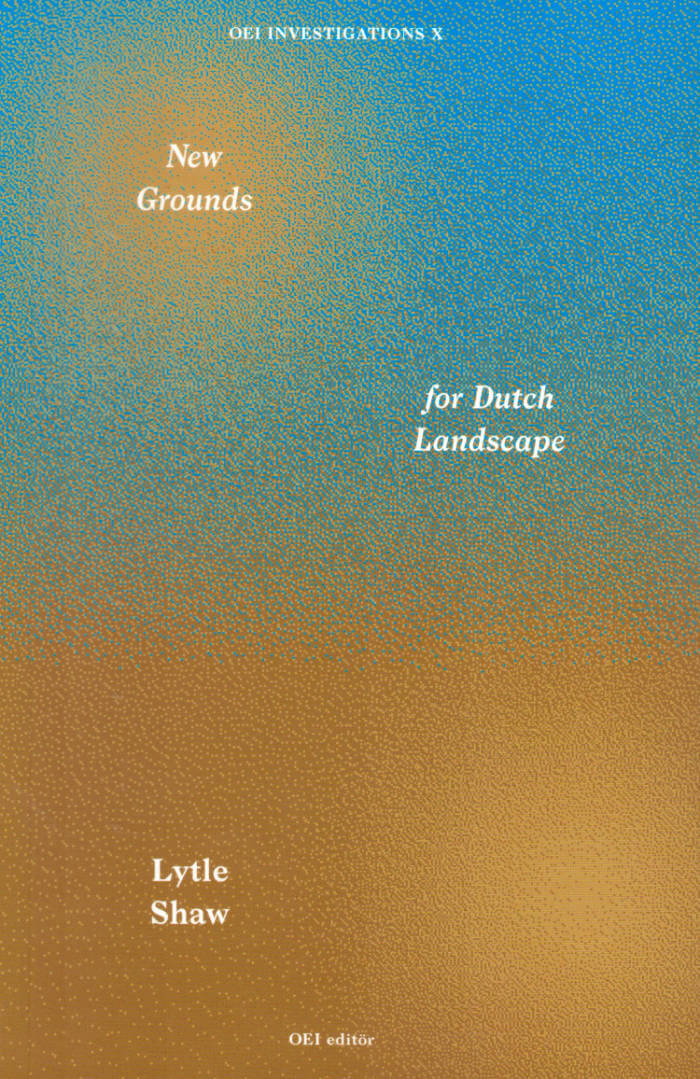
New Grounds for Dutch Landscape
New Grounds for Dutch Landscape uses an experimental, site-specific method to demonstrate how 17th century painters Jan van Goyen, Jacob van Ruisdael, and Meindert Hobbema did not so much represent the newly made landscape of Holland as reenact, through their painterly factures, its reclamation and ongoing threats to its stability: from flooding and drainage to abrasion and erosion.
These low-level dramas of recalcitrant matter allowed the Dutch to develop an ongoing temporality at odds with history painting’s decisive instant and a vocabulary of substance that wrested meaning away from humanist landscape painting’s expressive figures. — [publisher's note]

OEI #86/87 Publishing Practices, Publishing Poetics
Tobi Maier, Cecilia Grönberg and 1 more
Once more, an astonishing issue of OEI – a thrilling, compelling, stimulating feast of ideas regarding publishing and the book: the perfect big companion to read and hug in bed while the virus spreads outside.
Bringing together contributions from circa 130 publishing structures, publishing communities, magazines, small press endeavors, artists, poets, writers, editors, theoreticians, curators, scholars, and art bookstores, OEI # 86–87 reflects upon the challenges, pressures and possibilities of publishing and creating publics in different contexts and places in a time of far-reaching – economical, medial, political, social, technological – transformations.
The potential and the versatility of publishing open it to a diversity of practices and approaches in the arts, but as an eminently social form of art, a collective or micro-collective work with shared responsibilities, it is also a never-ending process of “crafting a variegated approach to how you create, publish, distribute, and build a social ecosystem around your efforts”, of trying to “build up and strengthen the community around these printed forms” (Temporary Services).
It is the conviction of OEI #86–87 that print has the power to play an important part in the construction of social spaces, of a social world. As Benjamin Thorel puts it in one of the essays in the issue, “conceiving of the dynamics of publishing as making publics as well as making things public is not a pun – insofar as the artists/publishers encompass, beyond the book itself, its possible ‘lives’, imagining the different spaces, and the different people, amongst whom a publication will circulate.” This is what Michael Warner has called “a public [as] poetic worldmaking”, implying “that all discourse or performance addressed to a public must characterize the world in which it attempts to circulate, projecting for that world a concrete and livable shape, and attempting to realize that world through address.”
This is also, as stressed by Annette Gilbert and others, what can make publishing such an active force, a force co-constituting texts and publications and publics. Indeed, with Michalis Pichler, it is tempting to say that in publishing as practice – perhaps more than in any other art field – “artists have been able to assert the aesthetic value of their own socio-politically informed concerns and to engage, often under precarious conditions, in cultural activities fully aligned with their political values.”
OEI #86–87 also includes sections on and with contemporary poetry from Canada; Fluxus publishing; Krister Brandt/Astrid Gogglesworth; Kalas på BORD (Öyvind Fahlström); Lars Fredrikson; Claude Royet-Journoud’s poetry magazines; Carl Einstein; Gail Scott; Ållebergshändelser; OEI #79: edit/publish/distribute!; “det offentligas försvinnande” and many many other things. [publisher’s note]
Design by Konst & Teknik

Five Essays from Present Continuous
The five essays printed here are excerpted from Part I of Present Continuous, a book of prose written during the first year of the coronavirus pandemic between March 2020 and April 2021 in Lewisham, London.
The essays in the present volume were written between March 2020 and June 2020: the movement from spring to summer, from the first announcement of a national lockdown to the Black Lives Matter protests sparked by the murder of George Floyd and Breonna Taylor in the United States and the death of Belly Mujinga in the UK. Nearly two years on, following a seemingly endless series of virus variants and subvariants, an apparent shift from pandemic to endemic, and a kind of exhaustion of vocabulary and will, I hope they provide some sort of record, not just of where “we” were in 2020, but where “we” are – or might be – now. (David Grundy, London, January 2022)
“It’s 2018 and we’re still on a train out of London, it’s 1967 or 1970 and Coltrane and Ayler are still in their material form, it’s 1943 and Artaud’s letters spill their remainder on the page, it’s April 2020 and all those presences are gone but their traces remain in the split voice, the overtone, the greater frequency overwhelming that base note which no longer guides in circumscribed lines. The actual presence of actual ghosts, silver on the mirrors, lost poetry, the noise it makes. It’s from the condition of being in the abyss itself that we learn how to climb out of it.”
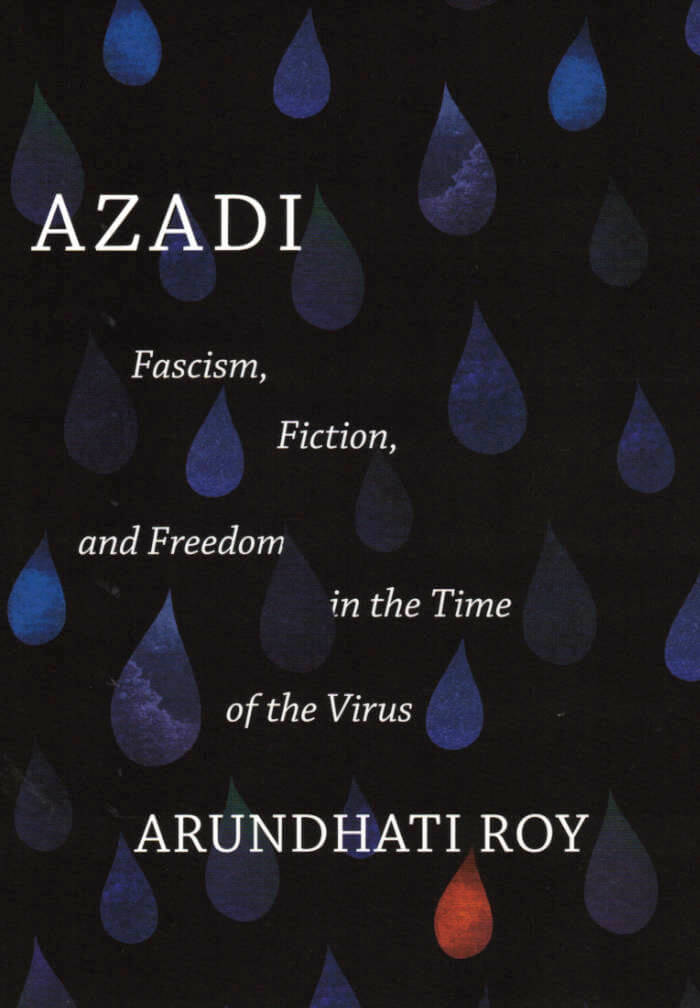
Azadi: Freedom. Fascism. Fiction.
The chant of 'Azadi!' — Urdu for 'Freedom!' — is the slogan of the freedom struggle in Kashmir against what Kashmiris see as the Indian Occupation. Ironically, it has also become the chant of millions on the streets of India against the project of Hindu nationalism. Just as Arundhati Roy began to ask what lay between these two calls for freedom — a chasm or a bridge? — the streets fell silent. Not only in India but all over the world.
The coronavirus brought with it another, more terrible understanding of azadi, making nonsense of international borders, incarcerating whole populations, and bringing the modern world to a halt like nothing else ever could.
In a series of essays, Arundhati Roy challenges us to reflect on the meaning of freedom in a world of growing authoritarianism

School Of Equals
Stijn Van Dorpe, Sarah Késenne
This book navigates the debate on (in)equality and arts education in a variety of ways. The process that editors Stijn van Dorpe and Sarah Késenne used to compile it follows a dialogue in which they provided contexts to one another but also strayed into the complexity of stories, viewpoints, and contradictions. They distinguish three different “politics”; three ways they believe the research has critical power and the potential to trigger action: through active, analytical, and corrective power; (in)consistencies; and (shared) praxis.
The book forms part of a series of projects and activities that they began as an initiative within the Audiovisual and Visual Arts Master at the LUCA School of Arts in Belgium.

The Buddhist
While ending an affair with a Buddhist teacher, Dodie Bellamy wrote about it simultaneously on her blog. This experiment in writing in extremis explores nuances of public shame, the vagaries of desire and rage, and Bellamy's confusion over the authenticity of group and individual spirituality. What is personal, what is public? In the electronic age, can anybody tell the difference?
The Buddhist celebrates marginalized subjectivity as enacted in the work of female artists from Bessie Smith to Eva Hesse and Carolee Schneeman, to Bhanu Kapil and Ariana Reines. The Allone Co. Edition contains the essence of the blog, as well as more extended narratives too explicit to post on line.
Design by Wayne Smith

Radicalizing Care – Feminist and Queer Activism in Curating
Sophie Lingg, Elke Krasny and 3 more
What happens when feminist and queer care ethics are put into curating practice? What happens when the notion of care based on the politics of relatedness, interdependence, reciprocity, and response-ability informs the practices of curating?
Delivered through critical theoretical essays, practice-informed case studies, and manifestos, the essays in this book offer insights from diverse contexts and geographies.
Contributions by Edna Bonhomme, Birgit Bosold, Imayna Caceres, Pêdra Costa, COVEN BERLIN, Nika Dubrovsky, Lena Fritsch, Vanessa Gravenor, Julia Hartmann, Hitomi Hasegawa, Vera Hofmann, Hana Janečková, k\are (Agnieszka Habraschka and Mia von Matt), Gilly Karjevsky, Elke Krasny, Chantal Küng, Sophie Lingg, Claudia Lomoschitz, Cathy Mattes, Elizaveta Mhaili, Jelena Micić, Carlota Mir, Fabio Otti, Ven Paldrano, Nataša Petrešin-Bachelez, Nina Prader, Lesia Prokopenko, Patricia J. Reis, Elif Sarican, Rosario Talevi, Amelia Wallin, Verena Melgarejo Weinandt, Stefanie Wuschitz.

(Forced) Movement
What would be of contemporary culture if we did not recognize the impact of migration in cultural and socio-economic crossings? This book explores human migration in different times, contexts, and geographies surrounding the Aegean Sea. Through an assemblage of voices, lived experiences, historical documents, urban and rural dislocations, this publication examines responses to mobility of the ones on the move, and of the ones living in the destinations the former are heading to. It speaks of the sacrifices one is forced to make en route and at its antipode; the implications of voluntary migration to a place, steered by investment in real estate.
(Forced) Movement
by Antigone Samellas
Amygdalia
by Christina Phoebe
To live in the Borderlands means you
by Gloria Anzaldua
In the Great Mara River
by Liwaa Yazji
Real-Estate Cosmopolitanisms
by George Papam
Uprootings/Xerizomoi
by Nicolas Lakiotakis

Architectures of Healing
Today, many feel fettered by insomnia, untouchability, and restrictions on movement. Looking for a more holistic approach to bodily and mental health, this book explores architectures and elementary forms of care and healing in different time periods: from the powers of sleep, touch, and travel in Asklepieia, the ancient healing temples for divine dream encounters alleviating the pain of the ailing pilgrim; to the attentiveness carried through the healing touch from the establishment of Byzantine hospitals till our times; to a pilgrimage center in modern-day Lesbos on a personal search for healing from the traumas of war and patriarchy; to the liberating and self-preserving powers of sleep as a healing response to past and current systems of oppression.
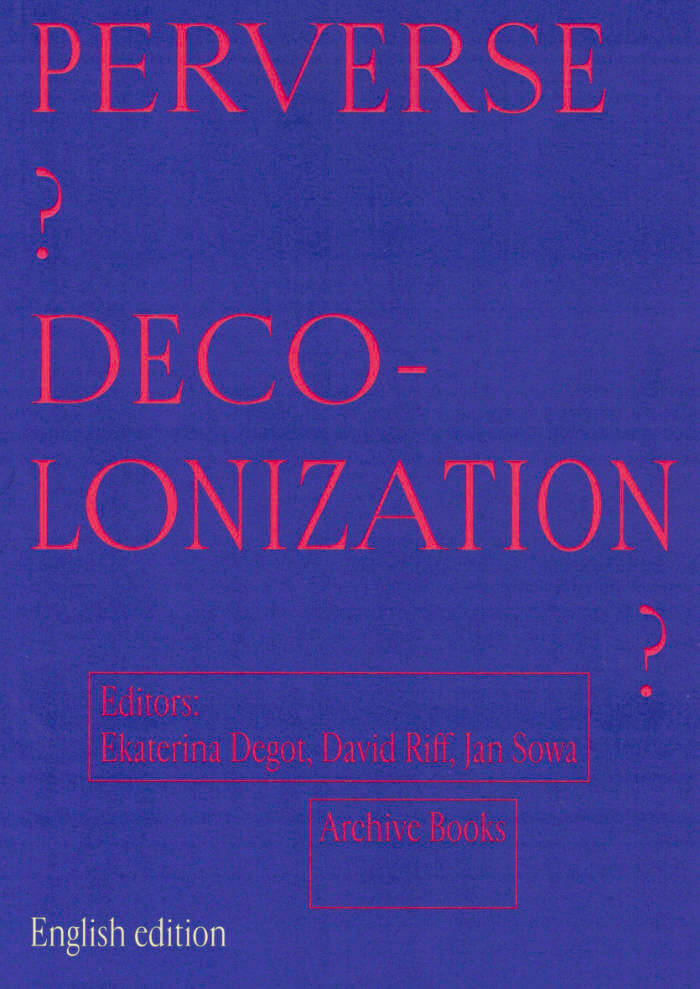
Perverse Decolonization?
Jan Sowa, David Riff and 1 more
Conversations and essays that question the twisted and oppressive climate in a world where true decolonization has yet to begin.
New nationalisms, toxic patriotisms and systems of exclusion have been on the rise for the last decade, reinforced by technology and rooted in colonialism, slavery and class oppression. Our time offers a unique twist on these age-old structures: rhetorics of decolonization are now weaponized by autocratic regimes, just as they are normalized in the phantasmagoria of cultural practices. It is this paradoxical and entangled situation that we, perhaps somewhat emotionally, started to refer to as "perverse decolonization." This book is the result of a (self-)critical project of discussions, workshops, exhibitions and meetings in Cologne, Poland, Israel, Hong Kong and Chicago. Its conversations and essays question the twisted and oppressive climate in a world where true decolonization has yet to begin.
Contributions by Avital Barak, Saddie Choua, Cosmin Costinaş, Ekaterina Degot, Natasha Ginwala, Andrzej Leder, Georgy Mamedov, Walter Benn Michaels, Joanna Rajkowska, David Riff, Aneta Rostkowska, Joshua Simon, Jan Sowa, Hito Steyerl, Mark Terkessidis, Mi You.
Published in February 2022
English edition
15 x 21 cm (softcover)
164 pages
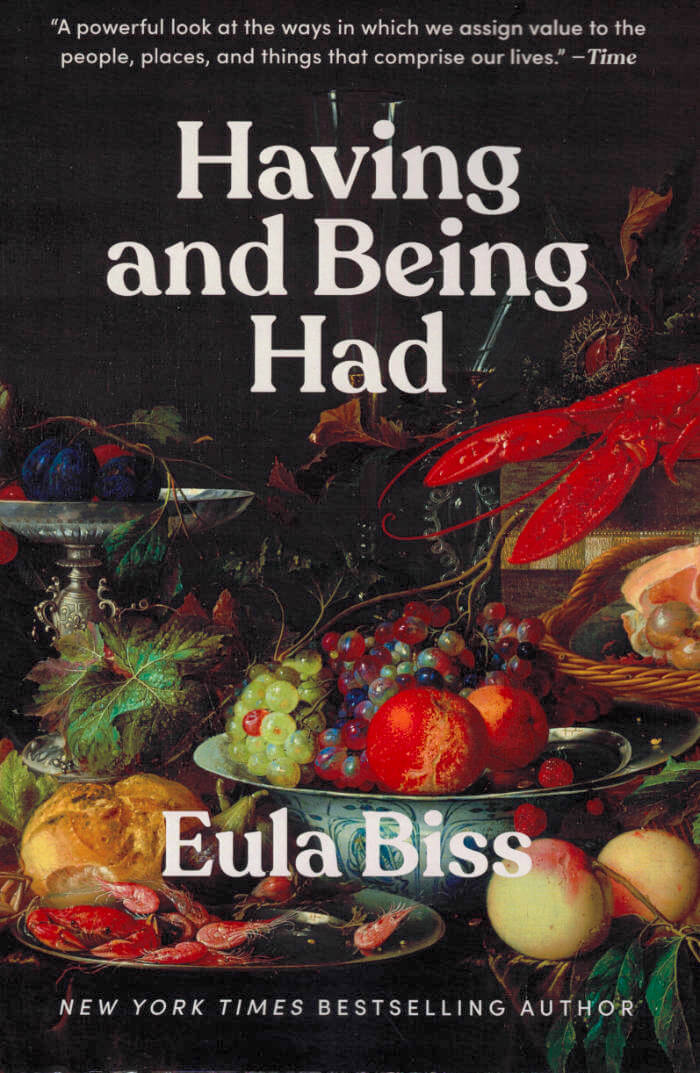
Having and Being Had
“My adult life can be divided into two distinct parts,” Eula Biss writes, “the time before I owned a washing machine and the time after.” Having just purchased her first home, the poet and essayist now embarks on a provocative exploration of the value system she has bought into. Through a series of engaging exchanges—in libraries and laundromats, over barstools and backyard fences—she examines our assumptions about class and property and the ways we internalize the demands of capitalism. Described by the New York Times as a writer who “advances from all sides, like a chess player,” Biss offers an uncommonly immersive and deeply revealing new portrait of work and luxury, of accumulation and consumption, of the value of time and how we spend it. Ranging from IKEA to Beyoncé to Pokemon, Biss asks, of both herself and her class, “In what have we invested?”
Eula Biss is the author of four books, including the New York Times bestseller On Immunity: An Inoculation, which was named one of the 10 Best Books of 2014 by The New York Times Book Review, and Notes from No Man's Land: American Essays, which won the National Book Critics Circle Award for criticism. Her work has appeared in Harper's Magazine, The New York Times, The Believer, and elsewhere, and has been supported by an NEA Literature Fellowship, a Howard Foundation Fellowship, and a Guggenheim Fellowship.
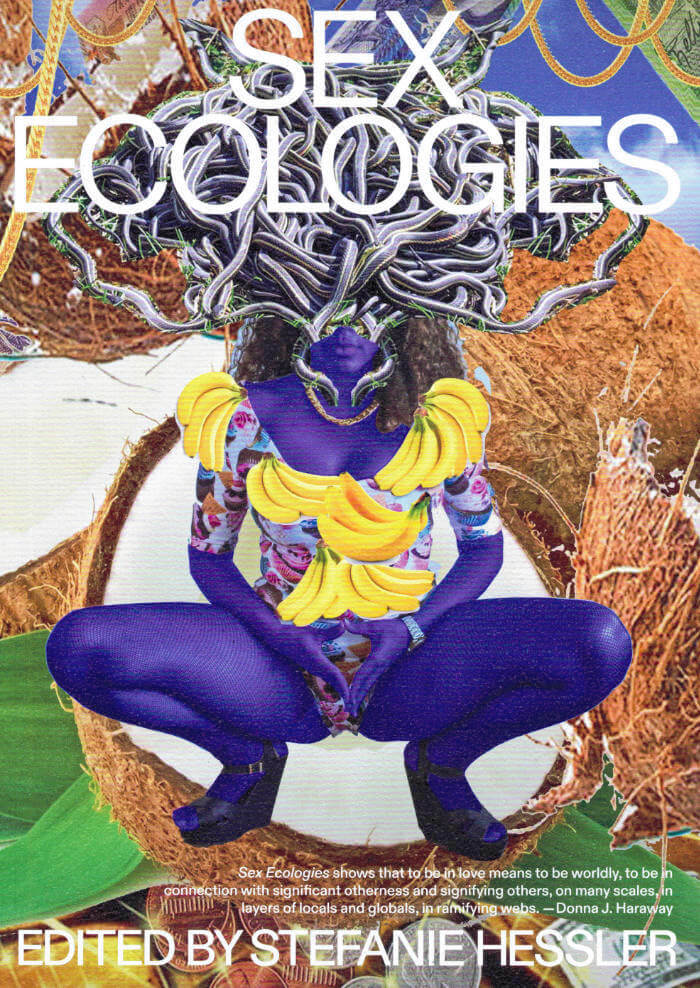
Sex Ecologies
Sex Ecologies explores pleasure, affect, and the powers of the erotic in the human and more-than-human worlds. Arguing for the positive and constructive role of sex in ecology and art practice, these texts and artistic research projects attempt nothing short of reclaiming the sexual from Western erotophobia and heteronormative narratives of nature and reproduction. The artists and writers set out to examine queer ecology through the lens of environmental humanities, investigating the fluid boundaries between bodies (both human and nonhuman), between binary conceptions of nature as separate from culture, and between disciplines.
In newly commissioned texts from such writers as Mel Y. Chen and Jack Halberstam and a selection of influential essays—including an annotated version of Audre Lorde's “The Uses of the Erotic: The Erotic as Power”—as well as images and sketches from works in progress by a diverse group of artists, Sex Ecologiescombines insights from the fields of art, environmental humanities, ecofeminism, gender studies, science, technology, political science, and indigenous studies.
Sex Ecologies, which accompanies an exhibition of the same name at Kunsthall Trondheim, emerges from an arts-driven research project collaboratively developed between the art center and the Seed Box environmental humanities collaboratory. Conceived not as a result but as a seed arising from this transdisciplinary fertilization, the volume presents a case for the role of sex in environmental and social justice.
Contributors:
Katja Aglert,Tarsh Bates, adrienne maree brown, Mel Y. Chen, Pauline Doutreluingne, Léuli Eshrāghi, Jes Fan, Ibrahim Fazlic, Jack Halberstam, niilas helander, Stefanie Hessler, Jenny Hval, Anne Duk Hee Jordan, Jessie Kleemann, Audre Lorde, Nina Lykke, Montserrat Madariaga-Caro, Camila Marambio, Astrida Neimanis, Pedro Neves Marques, Okwui Okpokwasili, Marie Helene Pereira, Margrethe Pettersen, Laure Prouvost, Filipa Ramos, Catriona Sandilands, Sami Schalk, Serubiri Moses, Leanne Betasamosake Simpson, Annie Sprinkle and Beth Stephens, Kim TallBear, Anna Tje, Alberta Whittle, Victoria Wibeck, Elvia Wilk
Copublished with Kunsthall Trondheim (Norway) and the Seed Box (Sweden)
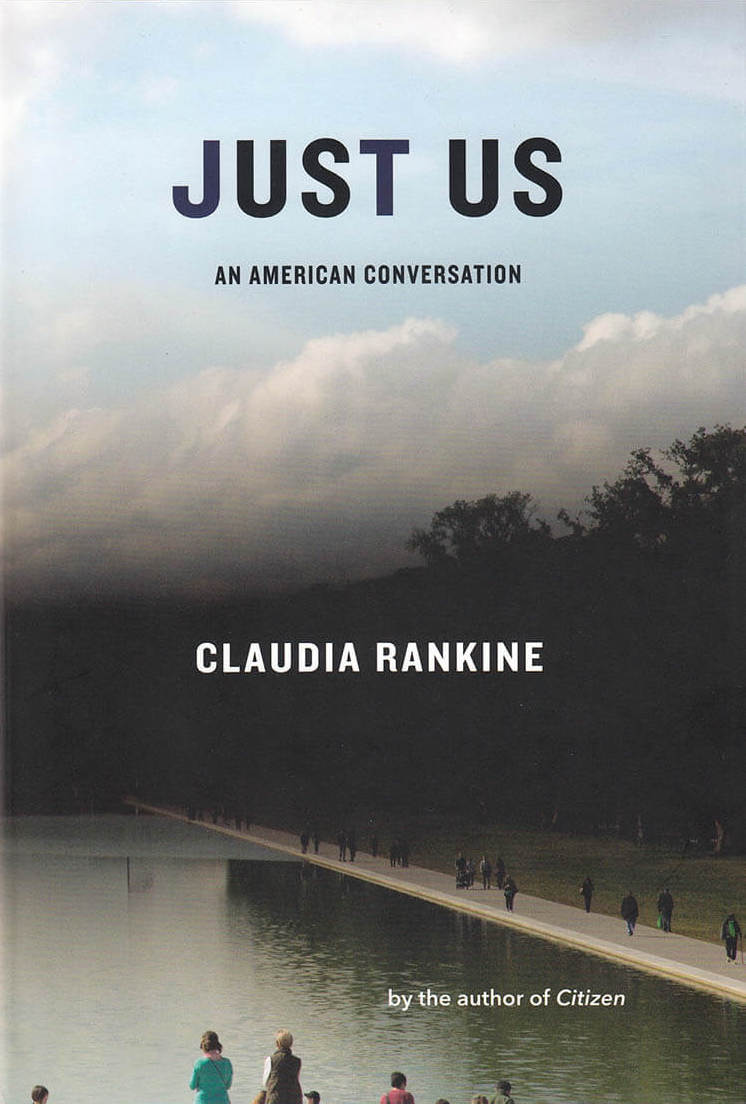
Just Us: An American Conversation
In Just Us, Claudia Rankine invites us into a necessary conversation about Whiteness in America. What would it take for us to breach the silence, guilt, and violence that arise from addressing Whiteness for what it is? What are the consequences if we keep avoiding this conversation? What might it look like if we step into it? "I learned early that being right pales next to staying in the room," she writes.
This brilliant assembly of essays, poems, documents, and images disrupts the false comfort of our culture's liminal and private spaces—the airport, the theater, the dinner party, the voting booth—where neutrality and politeness deflect true engagement in our shared problems. Rankine makes unprecedented art out of the actual voices and rebuttals of others: White men responding to, and with, their White male privilege; a friend clarifying her unexpected behavior at a play; and women on the street expressing the political currency of dyeing their hair blond, all running alongside fact-checked notes and commentary that complement Rankine's own text, complicating notions of authority and who gets the last word. Funny, vulnerable, and prescient, Just Us is Rankine's most intimate and urgent book, a crucial call to challenge our vexed reality.
Claudia Rankine is a poet, an essayist, and a playwright. Just Us completes her groundbreaking trilogy, following Don't Let Me Be Lonely and Citizen. She is a MacArthur Fellow and teaches at New York University.
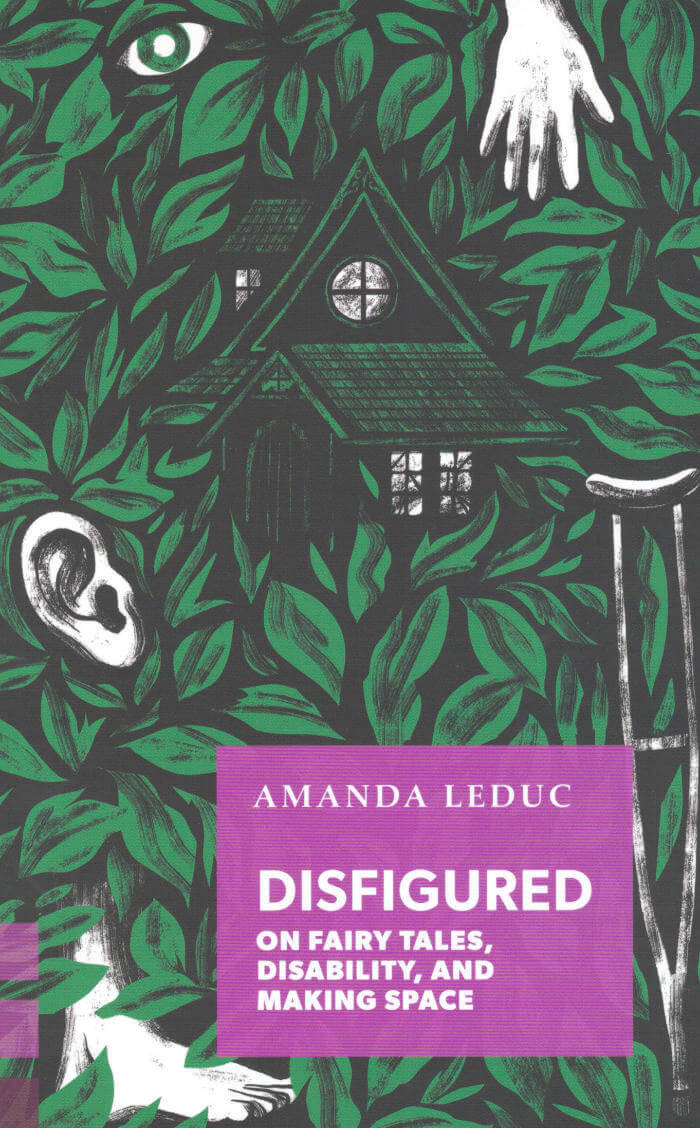
Disfigured: On Fairy Tales, Disability, and Making Space
Challenges the ableism of fairy tales and offers new ways to celebrate the magic of all bodies. In fairy tales, happy endings are the norm - as long as you're beautiful and walk on two legs. After all, the ogre never gets the princess. And since fairy tales are the foundational myths of our culture, how can a girl with a disability ever think she'll have a happy ending? By examining the ways that fairy tales have shaped our expectations of disability, Disfigured will point the way toward a new world where disability is no longer a punishment or impediment but operates, instead, as a way of centering a protagonist and helping them to cement their own place in a story, and from there, the world.
Through the book, Leduc ruminates on the connections we make between fairy tale archetypes - the beautiful princess, the glass slipper, the maiden with long hair lost in the tower - and tries to make sense of them through a twenty-first-century disablist lens. From examinations of disability in tales from the Brothers Grimm and Hans Christian Andersen through to modern interpretations ranging from Disney to Angela Carter, and the fight for disabled representation in today's media, Leduc connects the fight for disability justice to the growth of modern, magical stories, and argues for increased awareness and acceptance of that which is other - helping us to see and celebrate the magic inherent in different bodies.
Amanda Leduc's essays and stories have appeared in publications across Canada, the US, and the UK. She is the author of the novels The Miracles of Ordinary Men and the forthcoming The Centaur's Wife . She has cerebral palsy and lives in Hamilton, Ontario, where she works as the Communications Coordinator for the Festival of Literary Diversity (FOLD), Canada's first festival for diverse authors and stories.
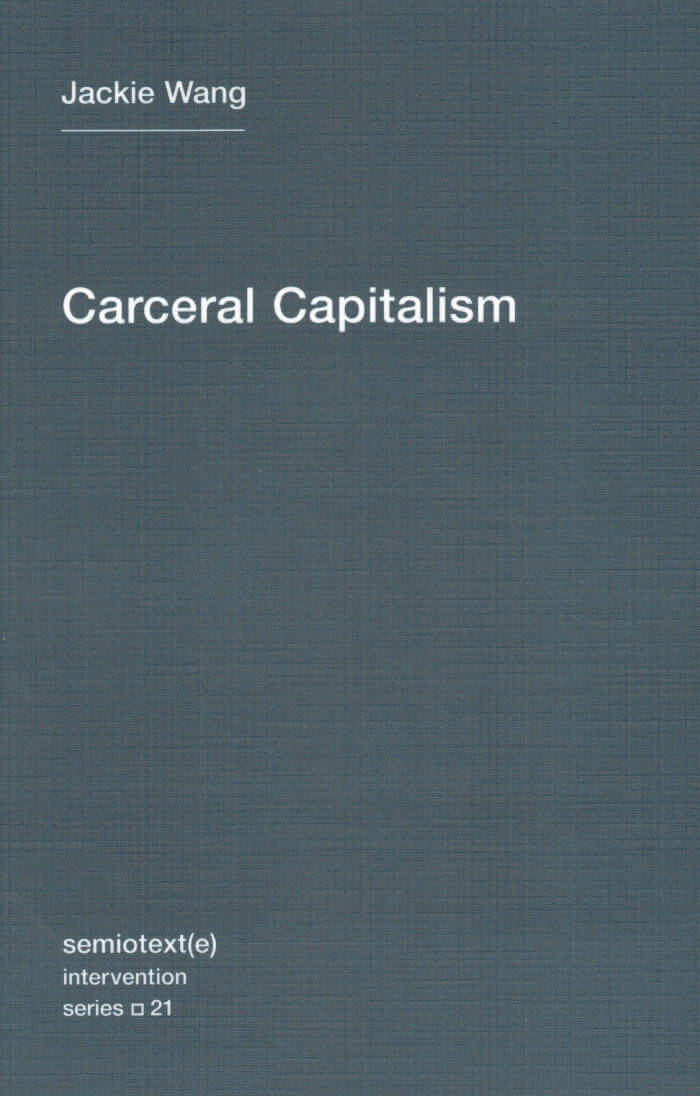
Carceral Capitalism
Essays on the contemporary continuum of incarceration: the biopolitics of juvenile delinquency, predatory policing, the political economy of fees and fines, and algorithmic policing.
What we see happening in Ferguson and other cities around the country is not the creation of livable spaces, but the creation of living hells. When people are trapped in a cycle of debt it also can affect their subjectivity and how they temporally inhabit the world by making it difficult for them to imagine and plan for the future. What psychic toll does this have on residents? How does it feel to be routinely dehumanized and exploited by the police?
In this collection of essays in Semiotext(e)'s Intervention series, Jackie Wang examines the contemporary incarceration techniques that have emerged since the 1990s. The essays illustrate various aspects of the carceral continuum, including the biopolitics of juvenile delinquency, predatory policing, the political economy of fees and fines, cybernetic governance, and algorithmic policing. Included in this volume is Wang's influential critique of liberal anti-racist politics, "Against Innocence," as well as essays on RoboCop, techno-policing, and the aesthetic problem of making invisible forms of power legible.
Wang shows that the new racial capitalism begins with parasitic governance and predatory lending that extends credit only to dispossess later. Predatory lending has a decidedly spatial character and exists in many forms, including subprime mortgage loans, student loans for sham for-profit colleges, car loans, rent-to-own scams, payday loans, and bail bond loans. Parasitic governance, Wang argues, operates through five primary techniques: financial states of exception, automation, extraction and looting, confinement, and gratuitous violence. While these techniques of governance often involve physical confinement and the state-sanctioned execution of black Americans, new carceral modes have blurred the distinction between the inside and outside of prison. As technologies of control are perfected, carcerality tends to bleed into society.
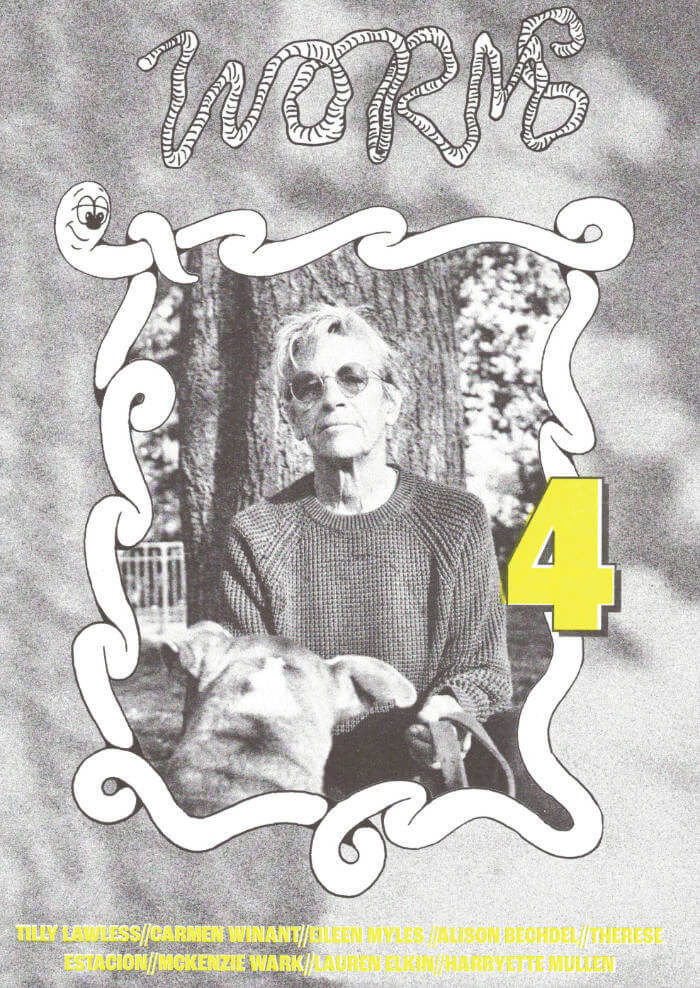
Worms #4 'The Flaneuse'
Worms #4 looks at psychogeography and the Situationists from a non-male perspective. Taking flâneuserie and the creative benefits of a good walk as its starting point, the issue features conversations with Eileen Myles, Alison Bechdel, Lauren Elkin, Tilly Lawless, Mckenzie Wark, Therese Estacion and Carmen Winant. 2021 was a fraught year for walking; the pandemic restricted our right to movement, while the murders of women walking in London led us to ask the question: how can the act of walking the streets spark political conversation?
Also included with this issue is an affirmation booklet in collaboration with @somuchluvindisclub
Worms is a biannual literary style magazine that celebrates female and non-binary writer culture.
‘If you’re reading this, you are a worm. We’re all worms, and in the end, we’re going to be eaten by them. As a (book)worm, you will fertilize your mind with glorious words…’
Founded in 2019 by Clem Macleod during her degree at Central Saint Martins, Worms began with a mad, spiralling obsession with the late Kathy Acker.
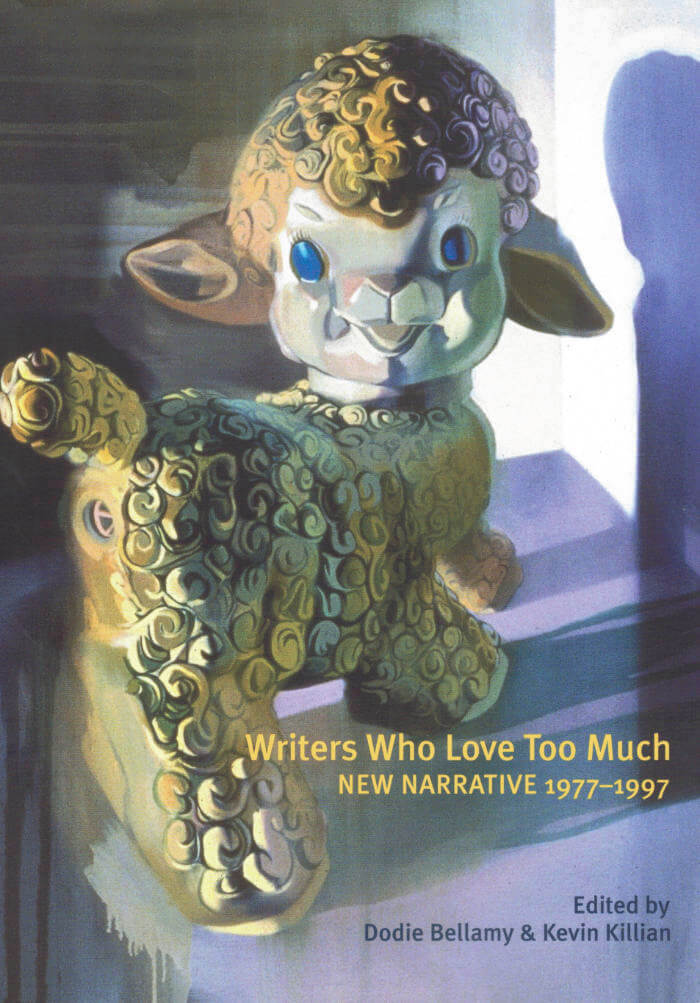
Writers Who Love Too Much: New Narrative 1977-1997
This long overdue anthology of New Narrative includes both classic New Narrative texts and rare supplementary materials, allowing the movement fueled by punk, pop, porn, French theory, and social struggle to bound back to life, ripe with dramatic propulsion, to form a new map of late 20th century creative rebellion.
"Gossipy and uninhibited, its breath is hot in your ear. It wants to tell you everything, and it wants you to overshare back." — M. Milks
"One of New Narrative's all-time best jokes is about the movement itself. It's the parodic motto that Bellamy formulates in Academonia for New Narrative "at its worst" "I have sex and I'm smarter than you." But "sex without fantasy," Camille Roy posits, "is nothing." The pieces compiled in Writers Who Love Too Much don't restrict fantasy. They use, as Boone says, eros, rather than facts, as the matter of narrative. Sex and fantasy are for New Narrative the stuff of ordinary life." — Jean-Thomas Trembla
Contributors include: Steve Abbott, Kathy Acker, Michael Amnasan, Roberto Bedoya, Dodie Bellamy, Bruce Benderson, Charles Bernstein, Nayland Blake, Bruce Boone, Lawrence Braithwaite, Rebecca Brown, Kathe Burkhart, Marsha Campbell, Dennis Cooper, Sam D'Allesandro, Gabrielle Daniels, Leslie Dick, Cecilia Dougherty, Bob Flanagan, Robert Glück, Judy Grahn, Brad Gooch, Carla Harryman, Richard Hawkins, Ishmael Houston-Jones, Gary Indiana, Edith A. Jenkins, Kevin Killian, Chris Kraus, R. Zamora Linmark, Eileen Myles, John Norton, F.S. Rosa, Camille Roy, Sarah Schulman, Gail Scott, David O. Steinberg, Lynne Tillman, Matias Viegener, Scott Watson, Laurie Weeks.

On the Self-Reflexive Page II
Originally published in 2010, ‘On the Self-Reflexive Page’ is part artist’s book and part essay, part literary excavation and part typographical miscellany. For this second incarnation of Louis Lüthi’s anthology of thematically arranged pages, the original material has been significantly expanded and revised. Like its predecessor, the new version proposes a typology of nonverbal elements found in novels, short stories, and essays. In each of the pages reproduced here, the prose is interrupted by one of these nonverbal elements, from black or blank pages, drawings or collages, photographs or film stills, to fragments of text or visual poems that are distinct from a conventional page layout.

Transgender Warriors: Making History from Joan of Arc to Marsha P. Johnson and Beyond
This groundbreaking book, far ahead of its time when first published in 1996 and still galvanizing today, interweaves history, memoir, and gender studies to show that transgender people, far from being a modern phenomenon, have always existed and have exerted their influence throughout history. Leslie Feinberg, hirself a lifelong transgender revolutionary, reveals the origin of the check-one-box-only gender system and shows how zie found empowerment in the lives of transgender warriors around the world, from the Two Spirits of the Americas to the many genders of India, from the trans shamans of East Asia to the gender-bending Queen Nzinga of Angola, from Joan of Arc to Marsha P. Johnson and beyond.

Toward The Not-Yet: Art As Public Practice
Jeanne Van Heeswijk, Maria Hlavajova and 1 more
This volume from BAK, basis voor actuele kunst, combines handbook, dictionary, and anthology to investigate artistic practice aimed at achieving social change. With text and visual essays, definitions, exercises, interviews, and images, the contributors envision a praxis that is committed to experimenting with aesthetics and politics in ways that go beyond the conventions of Western modernity. These are practices that are interdisciplinary, theoretically informed, and politically driven, offering ways of being together otherwise. Catalyzed by the work of artist Jeanne van Heeswijk, which focuses on radicalizing civic processes, Toward the Not-Yet imagines and enacts alternative ways of conceiving the present and future.
Contributors, among them notable artists, scholars, activists, and writers consider ways of participating in civic life, including dreamscaping and radical listening; the creation of safer spaces for humans and nonhumans; ways of radically shifting laws and policies; and tactics and methods of collective sanctuary. Toward the Not-Yet is part of BAK's series of BASICS readers, debuting a SUPERBASICS variation that is larger, with more visual content.

Reading / Feeling
Frédérique Bergholtz, Tanja Baudoin
Reading / Feeling examines affect, a term that delineates a field where the personal and political meet in sensory movements between bodies. A pre-emotional experience, affect constitutes the social and economic relationships that make up the fabric of society. Reading / Feeling considers the meaning of affect in theory and artistic practice through texts by theoreticians, artists, and curators read in If I Can’t Dance’s Reading Groups in Amsterdam, Toronto, and Sheffield as part of the programme for Edition IV – Affect (2010–12). It also includes three new essays, short statements by Reading Group members, and artist pages.
Contributors: Sara Ahmed, Rhea Anastas, Lauren Berlant, Leo Bersani, Lone Bertelsen, Gregg Bordowitz, Judith Butler, Jeremiah Day, Gilles Deleuze, Lucien Febvre, Simone Forti, Adam Frank, Andrea Fraser, Félix Guattari, Michael Hardt, Sharon Hayes, Brian Holmes, Jutta Koether, Glenn Ligon, Brian Massumi & Mary Zournazi, Helen Molesworth, Andrew Murphie, Sina Najafi & David Serlin, George Orwell, Emily Roysdon, Eve Kosofsky Sedgwick, Baruch Spinoza, Susan Sontag, Jan Verwoert; it also includes: essays by Tanja Baudoin, Emma Cocker, Jacob Korczynski; contributions by Reading Group members Stephen Bowler, Alison J Carr, Belen Cerezo, Jon Davies, Anik Fournier, Victoria Gray, Linda Kemp, Wjm Kok, Janice McNab, Gabrielle Moser, Cecilia Paldino, Andrew James Patterson, Hester Reeve, Julie Swalloa, cheyanne turions, Vivian Ziherl; and artist pages by Matthew Lutz-Kinoy.
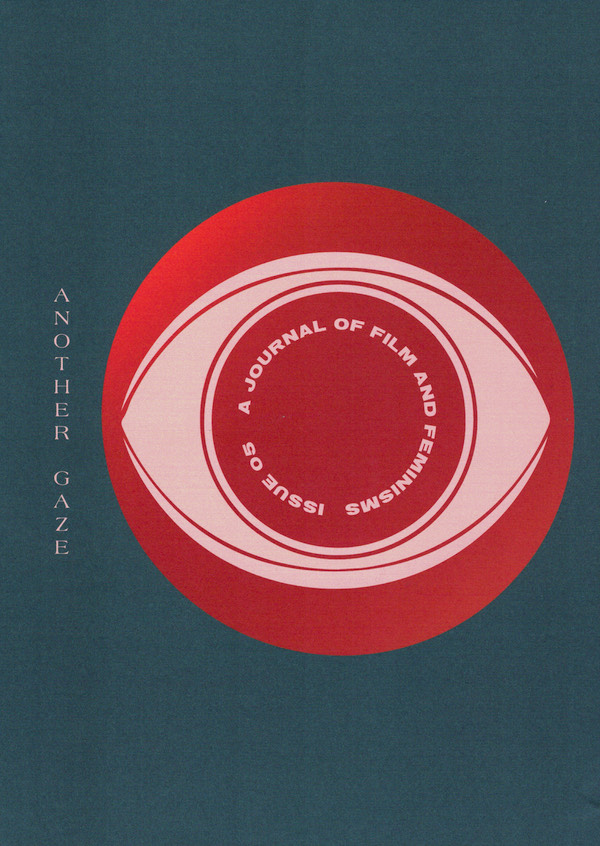
Another Gaze Journal 05
Missouri Williams, Daniella Shreir
Including writing about Theresa Hak Kyung Cha, Linda Manz, Sadie Benning, Sarah Maldoror, Cecilia Mangini, Agnes Martin, Peggy Ahwesh, Kira Muratova, Alina Szapocznikow, Jean Genet and more…
On subjects including an interrogation on cinephilia and gender, surveillance, infant observation during the pandemic and the screen as psychic portal, Beirut on film, devotional labour, prisons during lockdown, the notion of solidarity, reproduction and futurity, and much more... Roundtables about Sarah Maldoror; hands and fate, work, pleasure, touch, and surveillance; early women's travel films…
Plus, the year in review…
Featuring writing and contributions by María Palacios Cruz, Lizzie Borden, Kathryn Scanlan, Yasmina Price, Nicolas Russell, Rebecca Liu, Georgie Carr, Pooja Rangan, Jonathan Rosenbaum, Nuotama Bodomo, Phoebe Campion, Janaina Olivera, Cassie da Costa, Frank Beauvais, AS Hamrah, Awa Konaté and many more…